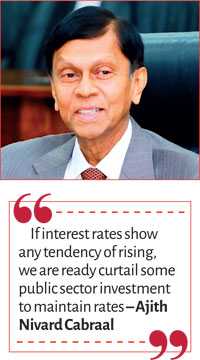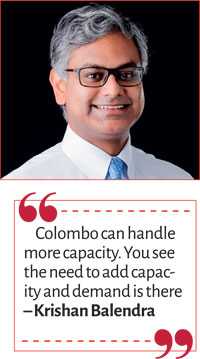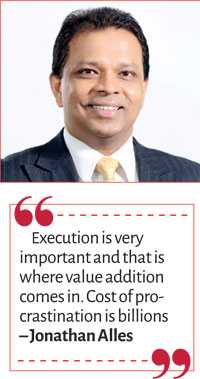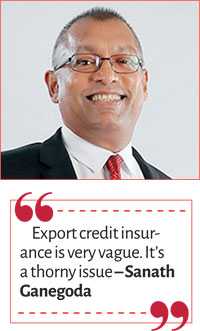Saturday Feb 14, 2026
Saturday Feb 14, 2026
Thursday, 3 December 2020 00:00 - - {{hitsCtrl.values.hits}}
By Darshana Abayasingha
With Budget 2021 well into the second half of its journey through Parliament – a mere formality for this house – the Government had opportunity to provide further clarity to some of the proposals it listed last week, whilst the private sector too had a chance to delve deeper.
State Minister Ajith Nivard Cabraal explained the Government is keen to hold interest rates steady at current levels for at least two years, and this would be given priority alongside strengthening our rate of exchange.
“If interest rates show any tendency of rising, we are ready curtail some public sector investment at that time to maintain rates at the levels we want to see,” he said. The Government does not want to get them to any condition to jeopardise the macro fundamentals.
The Moody’s issue
Cabraal was speaking at a forum hosted by Bartleet Religare Securities last week titled ‘Navigating the Paradigm Shift’. The State Minister responded to a number of questions posed on Budget 2021, and one of them dealt with the downgrade afforded to Sri Lanka by Moody’s Rating Agency, who stated it does not expect the budget to provide a meaningful boost to outputs and instead enhance fiscal pressure.
In response, the Minister said: “Moody’s jumped the gun, in my view. They brought in that downgrade of two notches well before the Budget could come in, now they are stuck with it. Whatever we put in the budget as credit positive they need to find a loophole to say that’s not a good thing. So, I think that is what is happening now. The nice thing about it is that investors have not followed Moody’s. The first day that Moody’s downgraded investors got a little upset. Then our bonds started having very high yields. But very soon, once they dived into the Sri Lankan credit and examined it carefully, they found that Moody’s statement was not with position. Now they have all begun to tighten much further and today’s rates belie the Moody’s reaction.
“So, I’m not taking Moody’s seriously on this particular part, because there have been so many credit positives. You have heard what Sri Lankan investors have said, and what other business people with foreign links have said, and none of that match up with what Moody’s say. So, I see it as a statement that Moody’s is compelled to make, because they have to defend their position and it is not warranted.”
 |
 |
 |
 |
Interesting exchange
State Minister Cabraal also stated he held discussions with several large international investors, and that Government is looking to persuade them to come to Sri Lanka. “We may see some movement next year,” he added.
“I think the current rates are very comfortable for all. The only thing I would like to see tighten is the exchange rate, it has gone beyond the comfortable range. If I was the Governor of the Central Bank, I would say it wouldn’t have gone to that extent. I would have been a lot more sensitive to it because I know the impact it has on debt and the impact on the Budget of having to allocate that much more rupees to buy the same dollars. It is a big burden I would like to avoid. It’s a big ingredient of our debt sustainability. We will take the necessary policy measures to encourage movement in that direction,” Cabraal assured.
Responding to further questions, the State Minister for Money, Capital Markets and State Enterprise said the Government has no intention to list State-owned enterprises on the Stock Exchange as privatisation is not part of the Government’s agenda. However, it could consider listing some of the instruments of SOEs as long as they do not disturb this policy, he said.
Once again, he invited more companies to list debt on the stock exchange as seen in developed markets, noting this would bring stability to some organisations. “We have thought outside the box and provided certain incentives, which are quite different to what was offered earlier,” and this should boost further listings on the stock exchange he said.
Tax administration
The Government has mooted a Budget monitoring process under his ministry to keep a close tab consistently on implementation of proposals, Cabraal said. The Government will bear the cost of the additional Rs. 2 provided for remittances of workers overseas, and provisions have already been made for this in the Budget. The new Special Goods and Services Tax on excise items will be announced before the finalisation of the Budget, Cabraal said, and noted that the question for motor vehicles will not arise in the near future.
Tax administration will be improved and the 0.25 of taxation on turnover of companies will be helpful towards revenue enhancement, Cabraal said, alongside new features like the 1% tax on undisclosed income coming into the tax net. With excise, the Government will introduce new methodology that have been proven all over the world and derive greater amount of revenue – almost an additional Rs. 40 billion the Government estimates. “Leakages that have been there will be plugged very well and we can have those revenue targets achieved.”
“We have not said we are not going to ask questions. We have said you can bring the money. We have said you can bring the money you have not declared, and that does not mean it’s tainted. There can be instances where people have sold land and not mentioned the full value. Some countries have no taxes at all, but that does not mean it encourages money laundering. There is no danger of this going into a FATF question mark,” Cabraal noted.
Supporting development efforts
He also stressed the need to reduce construction costs in Sri Lanka as it in amongst the highest in the world. The government is looking at a composite evaluation, which for instance will bring down the cost of cement, as raw material costs need to be managed. The Cess on imports of cement and clinker will be examined carefully to see how overall costs can be brought down. The Government is engaging cement manufacturers; and is are interested to note if they could guarantee entire local supply from Sri Lankan resources.
Cabraal also stated that port activity has sufficient space for growth, and the country needs more port related industries to come in. The new tyre factory coming in the Hambantota industrial zone with Chinese investment is going to be a very important investment, and the State would like to see many more investments like that coming in, he said, reiterating the Government is expecting some new ventures to come in over the next few months.
Ports of call
Joining the discussion was Krishan Balendra, Chairman of John Keells Holdings PLC, who also pointed to tremendous growth in port activity and underscored Colombo’s position as a major transhipment hub making 80% of volumes. With the addition of a third terminal, volume has grown substantially over the past six years despite freight volumes in the rest of the world staying largely flat, he said.
“This shows that if you have the adequate capacity in Colombo you can have growth in volumes. We have the capacity for eight million TEUs. Colombo can handle more capacity; it won’t be over capacity. You see the need to add capacity and then the demand is there,” Balendra said. The proposed East Container Terminal is right next to John Keells’ SAGT, and there is a lot of potential therein for both, he added.
Compared to the rest of the region, Sri Lanka has a lot of space to grow in almost every sphere the group is already invested in, and our potential in every sector is immense, the Chairman opined. In the short-term there may be over capacity, but as businesses and traffic numbers grow there will be demand for more services. It is in this content, JKH is looking at large integrated development like Cinnamon Life, he explained, pointing to tremendous potential for retail and entertainment sectors.
Balendra said there would be no real change in terms of sector focus for JKH, adding the Cinnamon Life development will be completed well before the Port City is finished, with over 65% of apartments already sold. The Port City will help increase development for property, he added. It is important to manage new supply of hotel rooms to ensure people who have already invested get returns, he noted.
Banking perspective
HNB Managing Director Jonathan Alles said Budget 2021 provides several interesting areas for the banking sector with a lot of impetus to supporting SMEs, entrepreneurship and local production. “The Minister alluded to renewable energy and this is a vital area we are looking to support,” he added. “The banking sector must not ignore the fact it must continuously be available to support the requirements of the grassroot sectors and make funds available,” he stressed.
Execution of the Budget becomes very important and that is where the value addition comes in. The cost of procrastination is billions to Government and the private sector, Alles explained. He enthused at the Minster pointing to significant new foreign investments materialising over the course of next year, and Sri Lanka must keep telling its story and get these transactions off the ground without just letting them be stories.
Alles however opined that normal economics suggest it would be difficult to hold interest rates down with domestic funds being used to bridge the deficit. Interest rates can also marginally move upwards if credit growth picks up. Having said that rates are at unprecedented lows, so even if they inch up marginally it would still be very affordable, he explained.
Credit growth could be moderate in the first half of 2021, and asset quality will continue to be under pressure, and banks need to watch what entities are able to start repayments after the moratorium is over. The country needs consistent taxation and it is hoped this would prevail over the coming years, Alles said.
Tackling moratoriums
“We expect the banking sector tax to come down from 28% to 24%. The 0.25 insurance fund is not going to go down too well because it will have a significant impact on the bottom line. The risk weighted provisioning suspension; it has an impact on your capital adequacy, but then some of us banks are more than adequately capitalised. So, we would want a rating upgrade really, because currently we are impaired on account of LGD and likely to see some further impairments on account of the downgrade of Moody’s.
“Moratoriums are taken as modifications as far as accounting is concerned and not as reschedulements, which means you don’t have to impair. Prudency would require banks to asses every customer and transaction, and whilst you have provided that cover is it fair and right for you to take cover under this and keep them under the current bucket? In this light you will see the industry taking a position and then taking an estimate and identifying accounts that even post moratorium will have certain challenges. You might see us staging them from 1 to 2, which will then automatically entail a higher level of impairment which we have actually projected and forecasted. Those that we feel don’t have a chance and don’t have ancillary, we might be compelled to move straight into non-performing and start looking at full impairment and other courses of action. It will be based on individual clients,” Alles stated.
He praised the Government’s initiative to encourage overseas workers to bring in money through official channels, as these then get recorded and the government can calculate and know these amounts coming in. This would be worth the Rs. 2 paid in the short term, he opined, and it will help banks to leverage those individuals and do business with those beneficiaries for those funds coming in, he said.
Better industrial zones
Hayleys Group Executive Director Sarath Ganegoda pointed out that there still is still significant potential even in traditional sectors and room for growth across all sectors of business. He said exports have fared well despite the challenges of COVID-19 are fuelling sectors such as hospitality which have been greatly impacted. There is a global shift in supply chains and as people look at new destinations for manufacturing, Sri Lanka must take advantage of them, he added.
However, there are a few impediments, especially for manufacturing facilities outside zones due to the lack of comprehensive plan by authorities, he noted. As a result, Hayleys has decided going forward all its manufacturing operations will be restricted to industrial zones. But there is a lack of facilities with adequate water supplies and affluent treatment and disposal, he pointed out, with Katunayake and Biyagama the only areas with adequate industrial water and treatments facilities. “We are addressing all these with authorities, and I hope these could be fast tracked. We welcome the low interest rate regime and these are encouraging for investments,” he noted.
Ganegoda also remarked on the need to enhance export credit insurance, as what was said in the Budget is very vague. “It’s a thorny issue,” he said and with new customers around the globe it becomes increasingly difficult and these must be removed.
Wage and workers
Commenting on the Government’s proposal to increase wages of estate workers to Rs. 1,000 a day, Ganegoda averred: “I don’t see a gap between what Government wants to achieve and what we want. We are more than happy to do so, and they should earn more than Rs. 1,000 in today’s context. If we are talking about getting out of this middle-income trap and all that, what is this $ 5.5 a day and they should earn more? The issue is not that. The issue is cost per kilogramme for the industry. We will have to balance this. We will support the Government; we will talk to them and we will have to find a mechanism to balance both sides and have a win-win. If you look at productivity, Sri Lanka is 18kg per plucker per day, whereas Kenya is 60kg and India is 36kg per day. So, if you could agree on a mechanism to drive productivity and if you focus from our side on cost per kilogramme for plucked leaves, even if they were to get Rs. 2,000 we have no qualm and they should earn that. Without reaching productivity and you just make it a wage, then there are problems.”